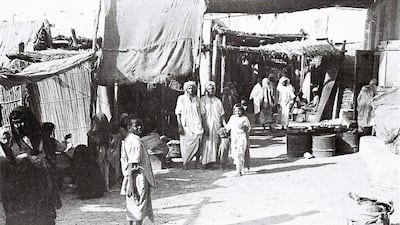When Talal Al Dhiyebi was a child, the central souq in Abu Dhabi was the heart of retail in the capital.
Today he is an executive at Aldar, which built both the modern answer to the market on the same site and a mall that will become the country’s second biggest when it opens in March.
Mr Al Dhiyebi, like many others who were born and brought up in the Emirates, has witnessed many changes in the country since it was founded 42 years ago.
“Retail has developed a lot since I was a little boy,” he said.
“Generally [the central souq] was where everyone used to be before proper shopping malls existed. Most of the other retailers were predominantly street retail.”
Back in the early 1970s, the situation was much the same in Dubai, which had been a trading hub since 1894, when Sheikh Maktoum bin Hasher Al Maktoum, the ruler of Dubai at the time, exempted foreign traders from taxes.
But in 1981, some 20 years ahead of the capital, Dubai opened its first modern shopping mall, paving the way for the establishment of the emirate’s reputation as a retail hub.
“[Al Ghurair Mall] was quite a breakthrough project for the time and for many years it was the place to be,” said David Thurling, the vice president for Al Ghurair Malls.
"It was a logical evolution of the market seeing how shopping malls were developing and evolving overseas," he added.
About a decade later another retail group was founded that would go on to be one of the largest in the country. Majid Al Futtaim opened its first property, Deira City Centre, in 1995. It was to be another pioneering addition to Dubai’s developing retail industry.
“[Mr Majid Al Futtaim] effectively brought a model that integrated shopping and entertainment in a single building, so it was quite pioneering at the time,” said George Kostas, the chief executive of Majid Al Futtaim Properties.
Mr Al Futtaim went on to sign up brands including Carrefour and open a string of malls across the Emirates, starting with city centre malls in Ajman and Sharjah before embarking on the company's most significant project yet, Mall of the Emirates.
“In our view it was going to be the biggest and the best, the iconic [property], the one that includes all of the experiences. He had a view about where Dubai was growing and how quickly it would grow,” said Mr Kostas.
“I think people looked at him saying, ‘You’re mad, you’re crazy. It’s not going to work. You are out in the middle of nowhere – who is going to come there?’ but we opened and the rest, as they say, is history. He was proven right.”
And before long, malls were springing up all over Dubai.
“Essentially what happened was that the retailers and the mall owners found with the increased numbers of shopping centres and retail outlets, the sales didn’t suffer. They grew in each shopping centre regardless of the fact that there were more shopping centres,” said David Macadam, the chief executive and vice chairman for the Middle East and North Africa region of the International Council of Shopping Centres and the Middle East Council of Shopping Centres.
Then came Dubai Mall, the world's biggest shopping centre, which opened amid the dark days of the global financial crisis but has gone on to be a resounding success.
“Today, the world’s most visited shopping and lifestyle destination, having welcomed more than 65 million visitors last year, and more than 55 million visitors in the first nine months of this year, The Dubai Mall already accounting for nearly 50 per cent of all luxury goods purchased in Dubai,” said a spokesman for the mall’s developer, Emaar Properties.
It may be the world’s biggest now, but with plans for more mega malls, the shopping centre could be put in the shade in the years to come.
“I think that with Mohammed Bin Rashid City you will see another shopping centre there that will rival Dubai Mall. They are talking about something even as large as 10 million square feet,” said Mr Macadam.
“That’s a massive mall, bigger than Dubai Mall. That would be the game changer. But you need something that big to host the world when they come for Dubai World Expo 2020 [should the emirate be successful in its bid],” he added.
As Dubai’s retail sector mushroomed in the 2000s, things were much quieter in the capital. Few shopping centres opened in the decade following the launch of Marina Mall and Abu Dhabi Mall – until this year.
This year has seen a spate of new openings in the capital, with The Galleria, a new luxury mall on Al Maryah Island, The World Trade Centre Mall on the site of the old Central Market and the community mall, Deerfields Townsquare all opening their doors in the last few months.
But the biggest is yet to come. At 235,000 square metres, Yas Mall, which is due to open in March, is smaller than Dubai Mall but a little bigger than Mall of the Emirates.
“It’s Abu Dhabi’s first regional super mall and it’s going to have everything that you need,’ said Mr Al Dhiyebi, who is the executive director of asset management at Aldar Properties.
And it is not the last. Other malls in the capital, including Sowwah Central on Al Maryah Island and The District on Saadiyat are planned for 2017.
“There is huge spending power in Abu Dhabi, Al Ain and the Western Region, which didn’t have enough venues to go out and shop. Tourists are also growing significantly now with the airport, with Etihad Airways and Abu Dhabi Tourism and Culture Authority,” said Mr Al Dhiyebi.
Alongside his company, others have spotted the same gap.
But whether the new malls will stop Abu Dhabi shoppers hitting the motorway to Dubai each weekend remains to be seen.
gduncan@thenational.ae


